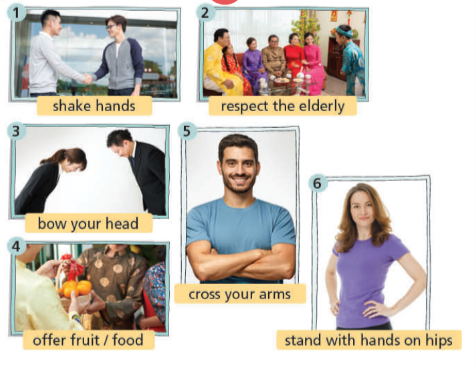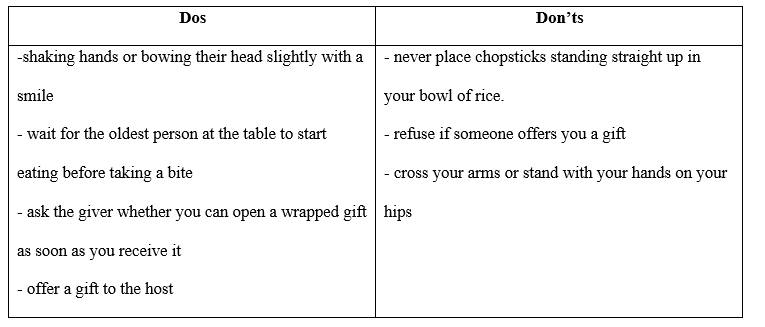Tiếng Anh 8 Unit 4 4a. Reading
Listen and repeat. Listen and put the word into the correct columns. Practise saying them with a partner. Listen to three people talking about customs. Match the speakers (A-C) to the customs (1-6) from Exercise 1.
Bài 1
Vocabulary
Customs
(Phong tục)
1 Listen and repeat.
(Lắng nghe và lặp lại.)

shake hands: bắt tay
respect the elderly: tôn trọng người già
bow your head: cúi đầu
offer fruit/food: biếu trái cây / đồ ăn
cross your arms: khoanh tay
stand with hands on hips: đứng chống tay lên hông
Bài 2
Pronunciation (/s/-/∫/-/z/)
2 Listen and put the word into the correct columns. Practise saying them with a partner.
(Nghe và đặt từ vào đúng cột. Thực hành nói chúng với một bạn cặp của em.)
cross refuse use visit
shake show easy should

Phương pháp giải:
cross /krɒs/
refuse /'refju:s/
use /ju:z/
visit /'vizit/
shake /∫eik/
show /∫əʊ/
easy /'i:zi/
should /∫əd/
Lời giải chi tiết:

Bài 3
Listening
3 Listen to three people talking about customs. Match the speakers (A-C) to the customs (1-6) from Exercise 1.
(Nghe ba người nói về các phong tục. Nối người nói (A-C) với các phong tục (1-6) từ Bài tập 1.)
Phương pháp giải:
Speaker A
People from different places have different customs from the way they greet each other to their body language. When I was on holiday in Japan, I found out that most people there don't greet each other the same way we do. In my country, they say hello by bowing their heads.
Speaker B
I love traveling, and I know that it's important to follow the customs of the local people. Last summer, I was on holiday in Vietnam. One day I was standing with my hands on my hips when I remembered that it was not polite, so I stopped myself.
Speaker C
I always like to bring a gift when a friend invites me to their home. No matter where you're from, one way to show your respect for hosts is to bring a small gift. Offering fruit or food to the host is a popular gift giving custom all over the world.
Tạm dịch:
Người nói A
Mọi người từ những nơi khác nhau có phong tục khác nhau từ cách họ chào nhau đến ngôn ngữ cơ thể của họ. Khi tôi có kì nghỉ ở Nhật Bản, tôi phát hiện ra rằng hầu hết mọi người ở đó không chào hỏi nhau giống như chúng ta. Ở nước tôi, họ chào bằng cách cúi đầu.
Người nói B
Tôi thích đi du lịch và tôi biết rằng điều quan trọng là phải tuân theo phong tục của người dân địa phương. Mùa hè năm ngoái, tôi đã đi nghỉ ở Việt Nam. Có hôm tôi đang đứng chống nạnh thì sực nhớ ra là không lịch sự nên tôi dừng lại.
Người nói C
Tôi luôn thích mang một món quà khi một người bạn mời tôi đến nhà của họ. Bất kể bạn đến từ đâu, một cách để thể hiện sự tôn trọng của bạn đối với chủ nhà là mang theo một món quà nhỏ. Biếu trái cây hoặc thức ăn cho chủ nhà là một phong tục tặng quà phổ biến trên toàn thế giới.
Lời giải chi tiết:

Bài 4
4 Which of the customs in Exercise 1 people should/ shouldn't do in your country?
(Phong tục nào trong Bài tập 1 mọi người nên/không nên làm ở nước của em?)
In my country, people should bow their heads to say hello and respect the elderly.
(Ở đất nước tôi, mọi người nên cúi đầu chào nhau và tôn trọng người già.)
In my country, people shouldn’t stand with hands on hips.
(Ở đất nước của tôi, mọi người không nên đứng chống nạnh.)
Bài 5
5 Look at the pictures and read the title of the text. What do you think the text is about?
(Nhìn vào những bức tranh và đọc tiêu đề của văn bản. Em nghĩ văn bản nói về điều gì?)

Lời giải chi tiết:
I think the text is about Vietnamese customs and traditional meal in Việt Nam.
(Tôi nghĩ rằng bài viết nói về về phong tục Việt Nam và bữa ăn truyền thống ở Việt Nam.)
Bài 6
6 Read the text. For questions (1-5), choose the correct options (A, B, Cor D). Listen and check.
(Đọc bài viết. Đối với câu hỏi (1-5), chọn các phương án đúng (A, B, Cor D). Nghe để kiểm tra.)
Vietnamese Customs
What should you do when you visit a different country? It's important to know their customs and you need to respect the local people. Read on to 1) about some customs in Vietnam.
Greetings
Most people greet each other by shaking hands or bowing their head slightly with a smile.
Eating and drinking
It's important to wait 2) the oldest person at the table to start eating before you take a bite. This custom shows that the local people really respect the elderly. Also, never place your chopsticks standing straight up in your bowl of rice. It's extremely rude.
Giving and receiving gifts
It's 3) to accept a gift, so you shouldn't refuse if someone offers you one. You should also ask the giver whether you can open a wrapped gift as soon as you receive it. If someone invites you to their home, you should 4) a gift to the host, like food or fruit.
Body Language
Don't cross your 5) or stand with your hands on your hips. It is impolite in Việt Nam.
1 A find B follow C learn D get
2 A on B for C in D at
3 A rude B impolite C bad D polite
4 A offer B refuse C accept D open
5 A hips B hands C heads D arms
Phương pháp giải:
Vietnamese Customs
What should you do when you visit a different country? It's important to know their customs and you need to respect the local people. Read on to learn about some customs in Vietnam.
Greetings
Most people greet each other by shaking hands or bowing their head slightly with a smile.
Eating and drinking
It's important to wait for the oldest person at the table to start eating before you take a bite. This custom shows that the local people really respect the elderly. Also, never place your chopsticks standing straight up in your bowl of rice. It's extremely rude.
Giving and receiving gifts
It's polite to accept a gift, so you shouldn't refuse if someone offers you one. You should also ask the giver whether you can open a wrapped gift as soon as you receive it. If someone invites you to their home, you should offer a gift to the host, like food or fruit.
Body Language
Don't cross your arms or stand with your hands on your hips. It is impolite in Việt Nam.
Tạm dịch:
Phong tục Việt Nam
Bạn nên làm gì khi đến thăm một quốc gia khác? Điều quan trọng là phải biết phong tục của họ và bạn cần tôn trọng người dân địa phương. Đọc để tìm hiểu về một số phong tục ở Việt Nam.
Lời chào hỏi
Hầu hết mọi người chào nhau bằng cách bắt tay hoặc hơi cúi đầu với một nụ cười.
Ăn uống
Điều quan trọng là phải đợi người lớn tuổi nhất trong bàn bắt đầu ăn trước khi bạn ăn. Phong tục này cho thấy người dân địa phương rất kính trọng người già. Ngoài ra, đừng bao giờ đặt đũa thẳng đứng trong bát cơm của bạn. Nó cực kỳ thô lỗ.
Tặng và nhận quà
Việc nhận một món quà là điều lịch sự, vì vậy bạn không nên từ chối nếu ai đó tặng bạn một món quà. Bạn cũng nên hỏi người tặng xem bạn có thể mở món quà được gói ngay sau khi nhận được không. Nếu ai đó mời bạn đến nhà của họ, bạn nên tặng một món quà cho chủ nhà, chẳng hạn như thức ăn hoặc trái cây.
Ngôn ngữ cơ thể
Đừng khoanh tay hoặc đứng chống tay lên hông. Đó là bất lịch sự ở Việt Nam.
Lời giải chi tiết:

Bài 7
7 List the ideas in the text under the headings Dos and Don'ts in Việt Nam. Tell the class.
(Liệt kê các ý tưởng trong văn bản dưới mục Nên và Không nên ở Việt Nam. Nói với cả lớp.)
Lời giải chi tiết:














Danh sách bình luận